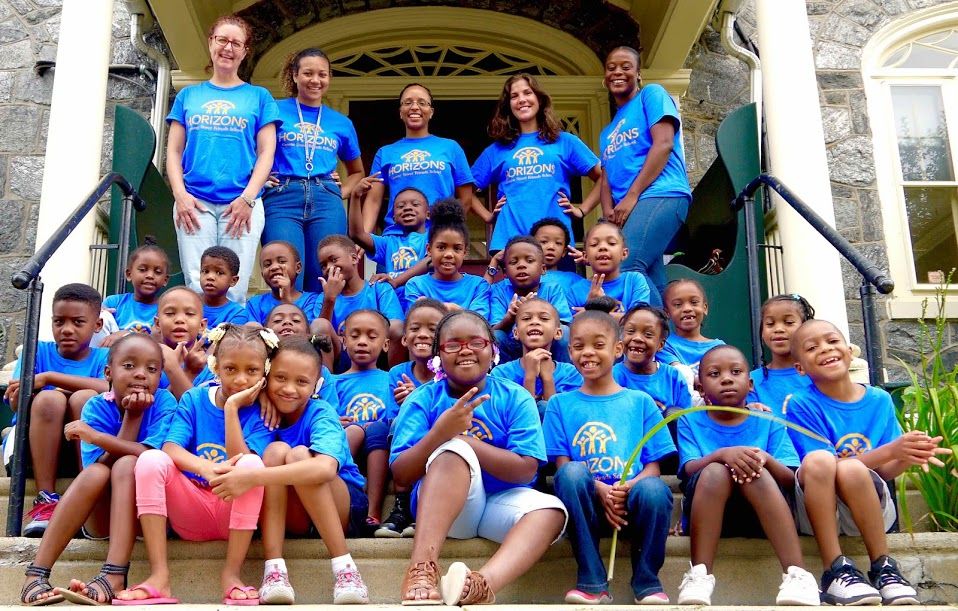- Home /
- News /
- 37th Annual Mold Symposium /
- Horizons at Greene Street Friends Celebrates Second Summer
Aug 21, 2017
Monday
Horizons at Greene Street Friends Celebrates Second Summer
For the second summer, Horizons at Greene Street Friends welcomed students from John Wister Elementary School for six weeks of academic, social, and emotional enrichment. This summer, Kindergarten and First Grade students were enrolled in the program, all of whom reside in Germantown. We talked with current Executive Director Lehla Olson and founding Executive Director Melody Regino about Horizons at Greene Street Friends’ past and future.
Tell Us About Horizons
LO: Horizons at Greene Street Friends lasts six weeks each summer. We partner with our neighborhood public school, John Wister Elementary School, and enroll fifteen students in each grade. Some parts of the day feel like school (math, reading, STEM) and some feel like adventure (daily swimming, field trips to places like The Academy of Natural Sciences, the Philadelphia Museum of Art, and Bounce U). The idea is that students start with us and they’ll grow with us through Eighth Grade.
What’s a “Typical Day” For Each Horizons Student?
MR: Each student arrives by 8:15 a.m. and we start with a morning warm up. This year we have breakfast together at 8:45, which is a highlight of my day. I love being all together as a community and it feels really peaceful. We started a new tradition this year of shooting stars at one Kindergartener and one First Grader who the teachers lift up, which is pretty adorable. All the teachers have yellow sunglasses that they put on because the stars are just too bright. Each student star also receives a pair and the whole group throws stars at them. They transition back to morning literacy work between 9:15-10:30, then head to recess, then have a special like science, art, or music with guest teachers. We eat lunch at noon and then the First Grade has recess and Kindergarten has a rest time. After that, both groups head to the pool for swimming lessons. Every Wednesday we’re on a field trip that is connected to the special of that week.
You’ve Both Mentioned Swimming as an Important Component of the Program. Can You Tell Us More?
LO: We really emphasize taking risks and how going outside of comfort zones each summer, like building new relationships, is an important part of the summer. The swimming piece is a lifelong skill that encourages our students to take risks and, historically, people of color have not had access to pools or swim lessons as a normal part of summer. But at Horizons, it’s a given that our students will be swimmers, it’s a given that each student will have swim lessons, and it’s a given that this is something you can do. There’s an equity piece, but there’s also that emphasis on taking a risk and trying something new.
How do Horizons student maintain their relationship with Greene Street Friends and their Horizons teachers throughout the school year?
MR: We want kids to feel like they’re part of a community that’s here for them September-June. It’s not like we close the doors after 6 weeks and aren’t your family. Last year we extended an invitation to all of our Horizons families to join us at the Greene Street Friends School Fall Fair. We provided tickets for games and foods, so there was no cost. For teachers to meet kids and begin to build relationships over the summer and then see them at school events like the Fall Fair is huge. We’re intentionally keeping that gap between Horizons and GSFS communities small, which is hard for many independent schools whose demographics are so different from the school year to the summer when they might host a program like Horizons. Last October, I called all of our families within the first 6 weeks of school just to check in. Then we had three formal touchpoints- the Fall Fair and two other events. A Board member hosted a holiday dinner where each family came, decorated a gingerbread house, and took home a bag of books. In the Spring, we had a newly accepted student/returning student reunion play and light dinner. In the beginning of the school year, I was going to Wister every month to check in with their teachers and so the kids could see me and know I wasn’t kidding about checking up on them. That also helped that the kids could see I came to them and they didn’t have to come to us. That will only grow.
Why Start Horizons at Greene Street? What Need Did You See?
LO: Ryan [Kimmet, Associate Head of School] came from Horizon’s flagship program in New Canaan Connecticut and our mission here at GSFS is to see the light in every kid, while creating the most diverse community possible. That could be racially, ethnically, socioeconomically, family structure, so many ways. One thing that I have seen since we’ve been here is our community asking how do we make Germantown, our neighborhood, match who’s here at GSFS? Tuition will always be a barrier for that. While we’re doing a lot of different things to increase scholarship availability, Horizons at Greene Street Friends feels like an access point. Horizons students feel Greene Street Friends and Horizons provides the structure like swimming and metrics like each family has to qualify for free or reduced lunch. Those are the metrics, but it feels like Greene Street Friends with two teachers per classroom, a play-based curriculum, and time to be creative. This program allows us to give what we know our students get in a way that we haven’t been able to do before.
What Drew Both of You to Horizons?
LO: Lots of things. For me, coming from public and charter world, I felt like the last couple of years finding the balance between opting out of an unfair system and being here at Greene Street Friends School as the Literacy Specialist. If we want to do something for a kid, there’s room to make that happen. We’re always working toward finding the best possible way to make that happen. The advantage feels very stark and I wonder where’s the balance? Hearing about Horizons, knowing who we were going to serve, it was clear to me that I wanted to be a part of the program. Last summer as the Horizons Literacy Specialist, seeing where they were and knowing you can have a say where the students go, makes me passionate about this work. I love the fact that we’re getting to see the parents throughout the year. Those touchpoints build relationships so that families can say, “These people know my kid, they’ve seen my kid grow, they’re not just here to check them in and out each summer like camp.”
MR: Ryan and Leah [Kimmet] started talking to me about Horizons when I first came to Greene Street Friends and I was like, “I’m in!” I went to Episcopal Academy’s Horizons program two summers ago, remember stepping on campus and immediately thinking about how we could put our own spin on an already great program that could be so impactful. I hoped to work for the School District of Philadelphia after graduate school, but couldn’t access it with all the hiring freezes. I happened upon Greene Street Friends and, using my counseling background on the population I studied, felt like I was living out the purpose of my degree
What Are Some of Your Favorite Memories?
MR: I have two. The Fall Fair is my favorite event here at Greene Street Friends. My family comes in for it and this year I was in the dunk tank. When I was in there, every other kid in line was a Horizons student. So, the line went Horizons student, Greene Street Friends student, Horizons student, etc. That made me feel so incredibly happy that these two worlds were colliding. From the outside looking in, you wouldn’t know that they were two worlds. My second is from last summer. We were doing a lot of work around nutrition, like introducing a new food every week. We hadn’t ordered pizza all summer and then there was one day where we ordered pizza. They had been out at recess, they come in, and I asked everyone to close their eyes. I’m describing what they’re going to eat for lunch and I start talking about octopus. I’m saying, “This is gonna be a little salty, rubbery, chewy, and we don’t yuck each other’s yums.” They knew the rules: you’re not allowed to say disgusting or gross. I could tell from their faces that some were nervous or making the face of gross, while others seemed intrigued while I describe this interesting thing. As this is happening, the teachers are putting pizza in the middle of the table so that when they open their eyes, they’re gonna see pizza. They open their eyes and more than half were disappointed that they weren’t going to get to try octopus. Our returners will tell you about it and have mentioned it to the Kindergarteners.
LO: That’s also one of my favorite memories too, because it shows how much they grew over the summer. That risk piece, going back to the pool, is huge. We’ve been doing these things all summer that seem small, but they’ve all been leading to you taking chances. One of our kids last year was really rigid around trying new things. Seeing his growth during the school year and him feeling safe when he comes here, trusting us, all those pieces are important to me. This morning we had kids sitting in different places at breakfast and it’s such a small group that we notice those things and who’s grumpy, excited, came in from a rough morning. Those things get missed when there’s a class of 25-30 kids. They get a lot of time that they don’t usually get.
MR: Another highlight is my birthday is two days away from one of the student’s and the mom texted me on my birthday. Knowing the families were still thinking about us and we were still thinking about them really made a huge impact on me. Our families know Horizons isn’t just a one and done. The families feel a connection to the adults in the program.
What Does Horizons Look Like In 2027?
MR: Our First Graders will be graduating high school and I hope that they’ll come back to be Counselors in Training and do some sort of high school summer enrichment program. Maybe it’s three weeks and intensive around getting into college. I hope that every single one of our students is going to college and I would love to have a full time social worker to do family check ins, home visits, and is someone that the families can reach out to. The Executive Director, at that point, will be raising a lot of money to make the program happen and won’t be able to have the same relationships with families as we do now. I think there will be a Program Director to focus on the academic side.
LO: It looks like a full program with K-8. As I’m learning this year, the more you add, the more you need to fine tune and manage systems. I see the need for every day building maintenance, using the new building, increasing family involvement and program offerings for them like GED classes. From all we know, access to education and empowering providers helps stop the cycle of generational poverty. I’m seeing some families looking for more for themselves. I’d like to see us empower them just as much as we’re helping their kids.


